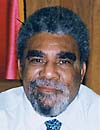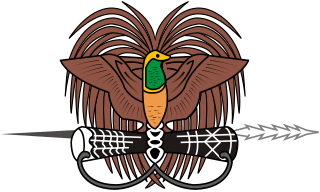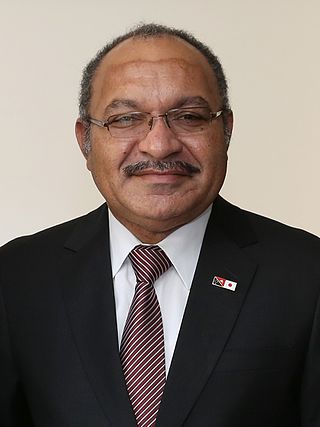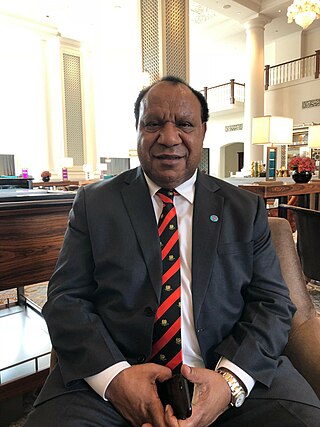
The politics of Papua New Guinea takes place in a framework of a parliamentary representative democratic multi-party system, whereby the prime minister is the head of government. Papua New Guinea is an independent Commonwealth realm, with the monarch serving as head of state and a governor-general, nominated by the National Parliament, serving as their representative. Executive power is exercised by the government. Legislative power is vested in both the government and parliament.

The People's National Congress is a political party in Papua New Guinea. Its former leader Bill Skate served as Prime Minister from 1997 to 1999 and as speaker of Parliament from 2002 to 2004. Skate died in 2006 and the party was led by Peter O'Neill until 2022. PNC originated from the National Capital District where former leader was the Governor of NCD and the Parliamentary Member. The party had 16 members in the 113-seat National Parliament of Papua New Guinea as of December 2022.

Sir Mekere Morauta was a Papua New Guinean politician and economist who served as the 7th Prime Minister of Papua New Guinea from 1999 to 2002. Inheriting a depressed economy and a fractious legislature, he embarked on fundamental reforms of the country's economy and political system.

Dame Carol Anne Kidu, also known as Carol, Lady Kidu, is an Australian-born Papua New Guinean politician.

Don Pomb Polye is a Papua New Guinean politician from Enga Province. He has been a Cabinet Minister under two Prime Ministers, and was briefly Deputy Prime Minister from July to December 2010. He has held Foreign Affairs, Immigration, Transport, Civil Aviation, Finance and Treasury portfolios.

The National Executive Council (NEC), also known as the Cabinet of Papua New Guinea functions as the policy and decision-making body of the executive branch within the government system of Papua New Guinea. The Prime Minister and Ministers serve as members of the Cabinet.
Francis Marus is a Papua New Guinean politician. He has been a member of the National Parliament of Papua New Guinea since July 2007, representing the electorate of Talasea Open. He was Minister for Higher Education, Research, Science and Technology in the government of Peter O'Neill from July 2016. He was previously the Deputy Speaker of the National Parliament from 2007 to 2012. He has variously represented the Pangu Party (2007–2012), the Papua New Guinea Party (2012–2013), the United Resources Party (2013–2014) and the People's National Congress (2014–present).

James Marape is a Papua New Guinean politician who has served as the prime minister of Papua New Guinea since May 2019. He has been a member of the National Parliament of Papua New Guinea since July 2007, representing the electorate of Tari-Pori Open in Hela Province in the New Guinea Highlands. He has held Cabinet Posts as Minister of Education (2008–2011), Minister of Finance (2012–2019), and Minister of Foreign Affairs (2023–present). Marape entered the 2022 elections under the banner of the Pangu Party and won more seats than any other party. He was therefore entitled to form the government. His new government was elected unopposed by the new parliament.
Ano Pala, is a Papua New Guinean politician. He has been a member of the National Parliament of Papua New Guinea since 2007, representing the electorate of Rigo Open. He is Minister for Justice and Attorney-General in the government of Peter O'Neill.

Peter Charles Paire O'Neill is a Papua New Guinean politician who served as the seventh Prime Minister of Papua New Guinea from 2011 to 2019. He has been a Member of Parliament for Ialibu-Pangia since 2002. He was a former cabinet minister and the leader of the People's National Congress between 2006 and 2022. He resigned his position as prime minister to avoid a vote of no confidence, and he was succeeded by James Marape. O'Neill won re-election to the National Parliament of Papua New Guinea in 2022 in the first round with a large majority, which is unusual in the country.
Ken Fairweather was a Papua New Guinean politician. He was a member of the National Parliament of Papua New Guinea from 2007 to 2017, representing the electorate of Sumkar Open. He was Minister for Housing and Urban Development in Peter O'Neill's first ministry in 2011, but was subsequently dropped from Cabinet.
Belden Namah is a Papua New Guinean politician. Namah is a member of the National Parliament for the Papua New Guinea Party, and has represented Vanimo-Green River District since 2007. He served in the Cabinet from 2007 to 2010, and as Deputy Prime Minister from 2011 to 2012. In 2012, Namah became a member of the opposition. After retaining his seat in the 2022 election, he said that he would not rejoin the opposition.

Theodore Zibang Zurenuoc is a Papua New Guinean politician who served as the acting governor-general of Papua New Guinea in February 2017.
2011–2012 Papua New Guinean constitutional crisis was a dispute between Sir Michael Somare and Peter O'Neill. Both claimed to be Prime Minister of Papua New Guinea.

General elections were held in Papua New Guinea from 23 June until around 13 July 2012, after being postponed by a further week to allow for security personnel to crisscross the country, particularly the highland provinces. The elections followed controversy over incomplete electoral rolls and a constitutional crisis caused by a dispute over the office of prime minister between Michael Somare and Peter O'Neill.

Corruption is rife in Papua New Guinea (PNG). According to The Economist, "PNG's governments are notorious for corruption, and ever run the risk of turning the state into a fully-fledged kleptocracy".

The 2012 Papua New Guinea Defence Force mutiny took place on 26 January 2012 when a group of military personnel headed by retired Colonel Yaura Sasa took the commander of the defence force, Brigadier General Francis Agwi, prisoner. The mutiny was related to a dispute over the prime ministership between Sir Michael Somare and Peter O'Neill which had begun in December 2011 when the Supreme Court of Papua New Guinea ordered that Somare be reinstated as the prime minister while the country's parliament supported O'Neill.

Rimbink Pato OBE is a Papua New Guinean constitutional lawyer and politician. He was Minister for Foreign Affairs and Trade from 2012 to 2019. Pato is the head of the United Party and its sole MP, representing Wapenamanda Open.
Sir John Pundari is a Papua New Guinean politician. He has been Speaker of the National Parliament (1997–1999), Deputy Prime Minister (1999), Minister for Foreign Affairs (2001), and currently serving as the Minister of Finance and Rural Development since 20 December 2020.
Patrick Pruaitch, CMG is a Papua New Guinea politician who represented the Aitape-Lumi constituency in the West Sepik Province of Papua New Guinea in the National Parliament of Papua New Guinea from 2002 to 2022. He was a Cabinet Minister with few interruptions from 2002–2010 and from 2012–2017. From November 2019–November 2020, he was Minister for Foreign Affairs. From 2017–2019 and 2020-2022 he was Leader of the Opposition. He was twice – in 2019 and 2020 – alternate PM in unsuccessful attempts to unseat the government.











